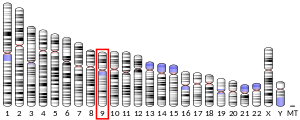호모사피엔스 종의 단백질 코딩 유전자
멜크 사용 가능한 구조물 PDB 직교 검색: PDBe RCSB PDB ID 코드 목록 4BKY , 4BKZ , 4D2P , 4D2T , 4D2V , 4D2W , 4IXP , 4UMP , 4UMQ , 4UMR , 4UMT , 4UMU , 5IHA , 5IHC , 5IH9 , 5IH8
식별자 별칭 MELK 외부 ID OMIM : 607025 MGI : 106924 HomoloGene : 32111 GeneCard : MELK EC 번호 2.7.10.2 직교체 종 인간 마우스 엔트레스 앙상블 유니프로트 RefSeq(mRNA) RefSeq(단백질) 위치(UCSC) Cr 9: 36.57 – 36.68Mb Chr 4: 44.3 – 44.36Mb PubMed 검색[3] [4] 위키다타
모태배아 류신 지퍼키나아제(MELK) 는 인간에서 MELK 유전자 에 의해 암호화된 효소 다.[5] [6] [7] MELK는 AMPK/Snf1 단백질 키나제 계열에 속하는 세린/스로닌 키나제 다. MELK는 생쥐 배아에서 산모 mRNA로 처음 확인되었다.[8] MELK 표현은 여러 암에서 증가하며 약리학적 억제의 적극적인 연구 대상이다.[9]
MELK는 이전에 암세포 증식에 필수적인 것으로 여겨졌다. 그러나 최근 크리스퍼(CRISPR )를 이용한 연구는 MELK가 암세포 성장에 전혀 필요하지 않다는 것을 증명해 보여 환자들에게 이 단백질을 표적으로 삼는 근거에 의문을 제기하고 있다. 결과는 실험 설계에 따라 달라진다. 따라서, 더 많은 연구가 필요하다. [10] [11] [12] [13]
상호작용 MELK는 CDC25B 와 상호작용 하는 것으로 나타났다.[14]
참조 ^ a b c GRCh38: 앙상블 릴리스 89: ENSG00000165304 - 앙상블 , 2017년 5월^ a b c GRCm38: 앙상블 릴리스 89: ENSMUSG000035683 - 앙상블 , 2017년 5월^ "Human PubMed Reference:" . National Center for Biotechnology Information, U.S. National Library of Medicine .^ "Mouse PubMed Reference:" . National Center for Biotechnology Information, U.S. National Library of Medicine .^ Nagase T, Seki N, Ishikawa K, Tanaka A, Nomura N (February 1996). "Prediction of the coding sequences of unidentified human genes. V. The coding sequences of 40 new genes (KIAA0161-KIAA0200) deduced by analysis of cDNA clones from human cell line KG-1" . DNA Research . 3 (1): 17–24. doi :10.1093/dnares/3.1.17 PMID 8724849 . ^ Heyer BS, Warsowe J, Solter D, Knowles BB, Ackerman SL (June 1997). "New member of the Snf1/AMPK kinase family, Melk, is expressed in the mouse egg and preimplantation embryo". Molecular Reproduction and Development . 47 (2): 148–56. doi :10.1002/(SICI)1098-2795(199706)47:2<148::AID-MRD4>3.0.CO;2-M . PMID 9136115 . ^ "Entrez Gene: MELK maternal embryonic leucine zipper kinase" .^ Heyer BS, Kochanowski H, Solter D (August 1999). "Expression of Melk, a new protein kinase, during early mouse development" . Developmental Dynamics . 215 (4): 344–51. doi :10.1002/(SICI)1097-0177(199908)215:4<344::AID-AJA6>3.0.CO;2-H PMID 10417823 . ^ Gray D, Jubb AM, Hogue D, Dowd P, Kljavin N, Yi S, et al. (November 2005). "Maternal embryonic leucine zipper kinase/murine protein serine-threonine kinase 38 is a promising therapeutic target for multiple cancers" . Cancer Research . 65 (21): 9751–61. doi :10.1158/0008-5472.CAN-04-4531 PMID 16266996 . ^ Lin A, Giuliano CJ, Sayles NM, Sheltzer JM (March 2017). "CRISPR/Cas9 mutagenesis invalidates a putative cancer dependency targeted in on-going clinical trials" . eLife . 6 . doi :10.7554/eLife.24179 PMC 5365317 PMID 28337968 . ^ Huang HT, Seo HS, Zhang T, Wang Y, Jiang B, Li Q, et al. (September 2017). "MELK is not necessary for the proliferation of basal-like breast cancer cells" . eLife . 6 . doi :10.7554/eLife.26693 PMC 5605198 PMID 28926338 . ^ Giuliano CJ, Lin A, Smith JC, Palladino AC, Sheltzer JM (February 2018). "MELK expression correlates with tumor mitotic activity but is not required for cancer growth" . eLife . 7 . doi :10.7554/eLife.32838 PMC 5805410 PMID 29417930 . ^ Settleman J, Sawyers CL, Hunter T (February 2018). "Challenges in validating candidate therapeutic targets in cancer" . eLife . 7 . doi :10.7554/eLife.32402 PMC 5805407 PMID 29417929 . ^ Davezac N, Baldin V, Blot J, Ducommun B, Tassan JP (October 2002). "Human pEg3 kinase associates with and phosphorylates CDC25B phosphatase: a potential role for pEg3 in cell cycle regulation" . Oncogene . 21 (50): 7630–41. doi :10.1038/sj.onc.1205870 PMID 12400006 .
추가 읽기 Lin ML, Park JH, Nishidate T, Nakamura Y, Katagiri T (2007). "Involvement of maternal embryonic leucine zipper kinase (MELK) in mammary carcinogenesis through interaction with Bcl-G, a pro-apoptotic member of the Bcl-2 family" . Breast Cancer Research . 9 (1): R17. doi :10.1186/bcr1650 . PMC 1851384 PMID 17280616 . Olsen JV, Blagoev B, Gnad F, Macek B, Kumar C, Mortensen P, Mann M (November 2006). "Global, in vivo, and site-specific phosphorylation dynamics in signaling networks" . Cell . 127 (3): 635–48. doi :10.1016/j.cell.2006.09.026 PMID 17081983 . S2CID 7827573 . Beullens M, Vancauwenbergh S, Morrice N, Derua R, Ceulemans H, Waelkens E, Bollen M (December 2005). "Substrate specificity and activity regulation of protein kinase MELK" . The Journal of Biological Chemistry . 280 (48): 40003–11. doi :10.1074/jbc.M507274200 PMID 16216881 . Vulsteke V, Beullens M, Boudrez A, Keppens S, Van Eynde A, Rider MH, et al. (March 2004). "Inhibition of spliceosome assembly by the cell cycle-regulated protein kinase MELK and involvement of splicing factor NIPP1" . The Journal of Biological Chemistry . 279 (10): 8642–7. doi :10.1074/jbc.M311466200 PMID 14699119 . Davezac N, Baldin V, Blot J, Ducommun B, Tassan JP (October 2002). "Human pEg3 kinase associates with and phosphorylates CDC25B phosphatase: a potential role for pEg3 in cell cycle regulation" . Oncogene . 21 (50): 7630–41. doi :10.1038/sj.onc.1205870 PMID 12400006 . Seong HA, Gil M, Kim KT, Kim SJ, Ha H (February 2002). "Phosphorylation of a novel zinc-finger-like protein, ZPR9, by murine protein serine/threonine kinase 38 (MPK38)" . The Biochemical Journal . 361 (Pt 3): 597–604. doi :10.1042/0264-6021:3610597 . PMC 1222342 PMID 11802789 . Suzuki Y, Yoshitomo-Nakagawa K, Maruyama K, Suyama A, Sugano S (October 1997). "Construction and characterization of a full length-enriched and a 5'-end-enriched cDNA library". Gene . 200 (1–2): 149–56. doi :10.1016/S0378-1119(97)00411-3 . PMID 9373149 . Gil M, Yang Y, Lee Y, Choi I, Ha H (August 1997). "Cloning and expression of a cDNA encoding a novel protein serine/threonine kinase predominantly expressed in hematopoietic cells". Gene . 195 (2): 295–301. doi :10.1016/S0378-1119(97)00181-9 . PMID 9305775 . Maruyama K, Sugano S (January 1994). "Oligo-capping: a simple method to replace the cap structure of eukaryotic mRNAs with oligoribonucleotides". Gene . 138 (1–2): 171–4. doi :10.1016/0378-1119(94)90802-8 . PMID 8125298 .







